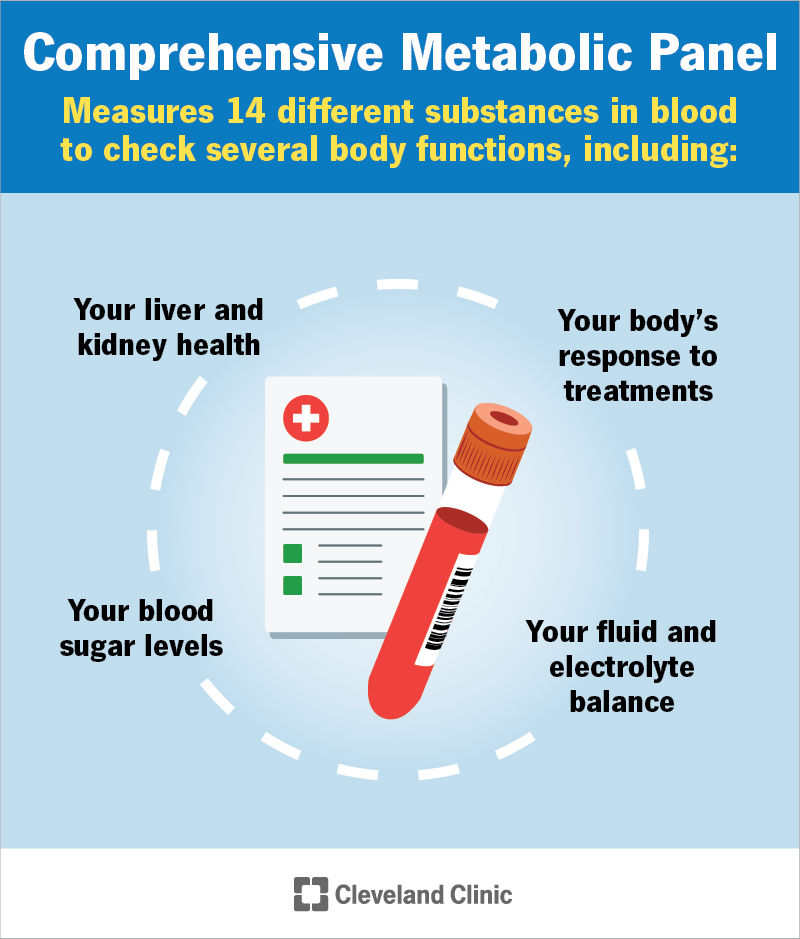A comprehensive metabolic panel (CMP) is a helpful and common test that measures several important aspects of your blood. Healthcare providers often use it as a routine test, and it can also help diagnose, screen for and monitor certain health conditions.

A comprehensive metabolic panel (CMP) is a blood sample test that measures 14 different substances in your blood. It provides important information about your body's chemical balance and metabolism (how your body transforms the food you eat into energy).
Healthcare providers often use a CMP as a routine blood test and to help diagnose, screen for or monitor certain health conditions.
Cleveland Clinic is a non-profit academic medical center. Advertising on our site helps support our mission. We do not endorse non-Cleveland Clinic products or services. Policy
A CMP measures the following substances in your blood:
A CMP also measures the following four electrolytes. Electrolytes are minerals that carry an electric charge when they are dissolved in a liquid. These electrolytes in your blood control nerve and muscle function and maintain the acid-base balance (pH balance) of your blood and your water balance.
A CMP also measures the following three liver enzymes. Enzymes are substances that act as a catalyst and allow certain bodily processes to happen.
Healthcare providers often use a comprehensive metabolic panel (CMP) to get a broad assessment of your overall physical health. With 14 individual measurements, it can check several body functions and processes, including:
Depending on the situation, your provider can have you undergo a CMP for the following reasons:
A comprehensive metabolic panel (CMP) can provide helpful information in many different situations, including:
A basic metabolic panel (BMP) includes eight of the 14 tests in a comprehensive metabolic panel (CMP). A BMP doesn’t include the liver enzyme and protein tests. Your healthcare provider may have you undergo a CMP or a BMP depending on your health history and needs. Both panels are considered routine blood tests.
A healthcare provider called a phlebotomist usually performs blood draws, including those for a comprehensive metabolic panel (CMP), but any healthcare provider trained in drawing blood can perform this task. A provider then sends the sample to the lab where a medical laboratory scientist prepares the samples and performs the tests on machines known as analyzers.
In order to prepare, you’ll likely need to avoid eating or drinking (fast) for 10 to 12 hours before your comprehensive metabolic panel blood test so that the glucose reflects a fasting sample, instead of sugars from food you’ve eaten. Your healthcare provider will give you specific instructions when they order the test for you.
You can expect to experience the following during a blood test, or blood draw:
The entire procedure usually takes less than five minutes.
After a healthcare provider has collected your blood sample, they’ll send it to a laboratory for testing. Once the test results are back, your healthcare provider will share them with you.
Blood tests are a very common and essential part of medical testing and screening. There’s very little risk to having blood tests. You may have slight tenderness or a bruise at the site of the blood draw, but this usually resolves quickly.
Blood test reports, including comprehensive metabolic panel test reports, usually provide the following information:
If any single CMP result or a combination of results are not normal, it may indicate — but not guarantee — many different health conditions, including:
If you have an abnormal result, your healthcare provider will likely have you undergo additional tests to confirm or rule out a specific diagnosis. If you have questions about your results, don’t be afraid to talk to your provider.
If one of your CMP results is abnormal, it doesn't necessarily mean that you have a medical condition. Other factors, such as diet, certain medications and health conditions can affect your test results. There could’ve also been an error in the collection, transport or processing of the test.
Your healthcare provider will take into consideration your medical history and current medications as well as your results and let you know if you need to undergo further testing.
In most cases, you should have your comprehensive metabolic panel test results within one or two days, though it could take longer.
A note from Cleveland Clinic
A comprehensive metabolic panel is a helpful and common blood test that broadly assesses your physical health. Know that having an abnormal level in one of your CMP results doesn’t necessarily mean you have a medical condition. Approximately 1 in 20 healthy people will have an abnormal test result. Many other factors can affect your results. Your healthcare provider will let you know if you need to undergo further tests to determine the cause of the abnormal level. Don’t be afraid to ask your provider questions. They’re there to help you.
Last reviewed by a Cleveland Clinic medical professional on 11/09/2021.
Learn more about our editorial process.
Cleveland Clinic is a non-profit academic medical center. Advertising on our site helps support our mission. We do not endorse non-Cleveland Clinic products or services. Policy